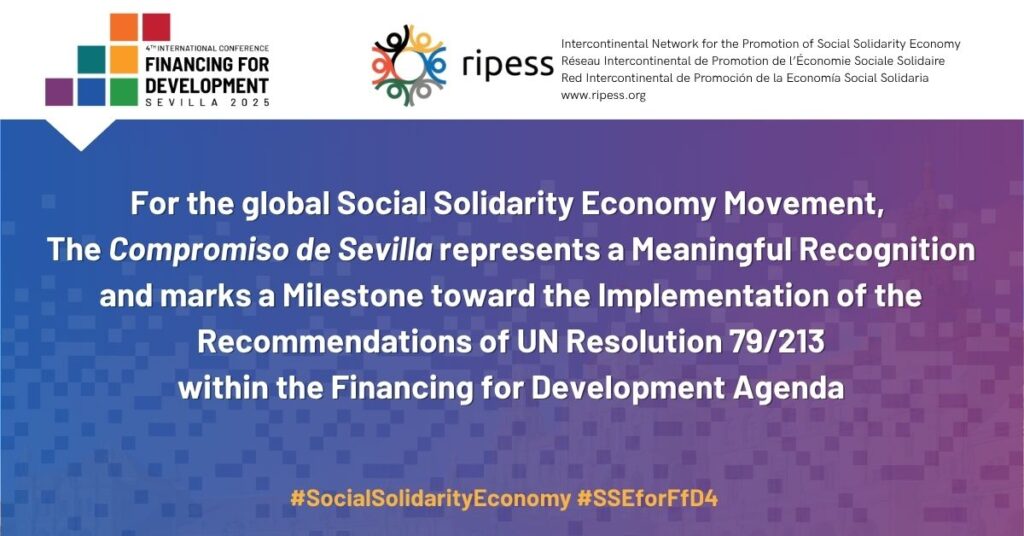The Fourth International Conference on Financing for Development (FfD4) concluded on July 3, 2025, with the formal adoption of the Sevilla Commitment and numerous engagements and proposals through the Plataforma de Sevilla. The Intercontinental Network for the Promotion of the Social Solidarity Economy (RIPESS), together with its membership based in grassroots organizations, co-led an important campaign to promote our transformative vision in the outcome document.
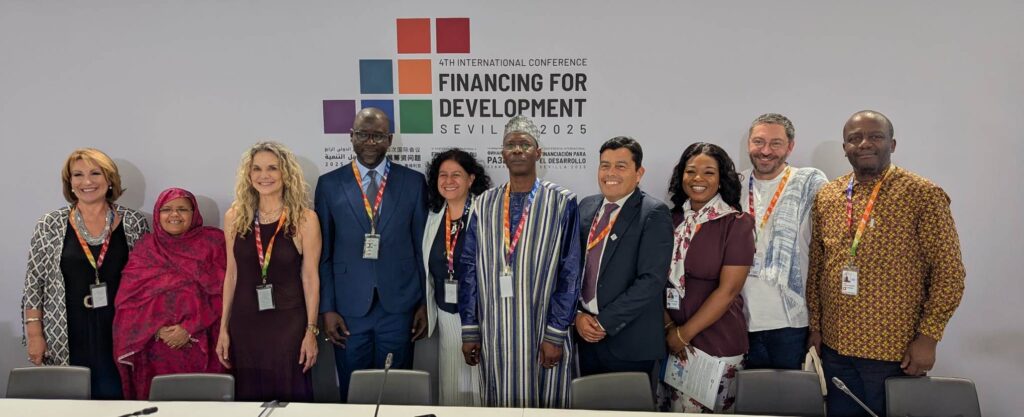
This campaign amplified the people-centered demands of the Social and Solidarity Economy (SSE) and turned them into proposals carried out during the forum. As an observer of the UN Inter-Agency Task Force on the SSE (UNTFSSE) and a member of its Technical Working Group on Financial Access and Support for SSE Entities, RIPESS led these proposals throughout the FfD4, following the four preparatory committee meetings from August 2024 to June 2025, from New York to Seville. Our strategy document was adopted by the UNTFSSE and shared with governments in Europe, Latin America, Africa, and Asia. At the same time the Civil Society Financing for Development Mechanism introduced for the first time as well the SSE in the Global Framework chapter of its Collective Elements Paper submitted to all Member States.
RIPESS at the FfD4 in Sevilla
RIPESS, represented by Mr. Madani Koumaré, the president of the African Network for Social and Solidarity Economy (RAESS) and co-coordinator of RIPESS, Ms. Sandra Moreno, Executive Secretary of RIPESS, and Ms. Andrea Rodriguez, Project Manager at RIPESS Europe, actively participated in numerous spaces within and outside the FfD4 in Seville.
Through its strategic presence, RIPESS brought the voice of the Social and Solidarity Economy (SSE) to the main forums for dialogue, advocacy, and collaboration, reaffirming its commitment to a fairer, more inclusive, and people-centered global financial architecture.
Official Side Event: “Mainstreaming the Social and Solidarity Economy in the Financing for Development Agenda and its Follow-up”
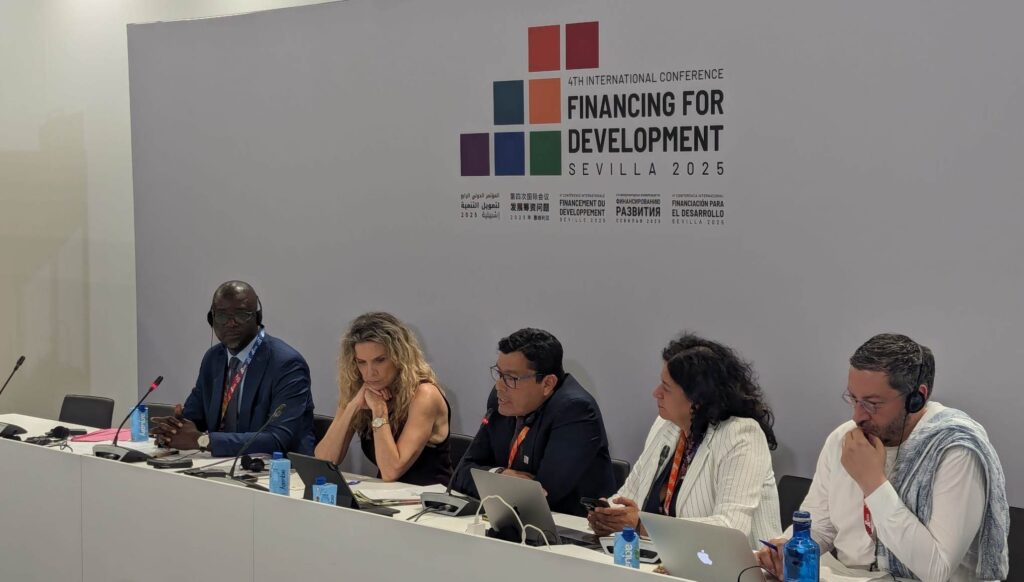
The side event, co-organized by RIPESS, the Global Fund for Cities Development (FMDV), and the UNTFSSE, with the collaboration of the Spanish Ministry of Labor and Social Economy, the Colombian Ministry of Labor’s Special Administrative Unit of Solidarity Organizations, and the Ibero-American Network of Governments for the Social and Solidarity Economy (RIFESS), featured a warm welcome address by Ms. Simel Esim, Head of the ILO’s Cooperative, Social and Solidarity Economy Unit and Chair of the UNTFSSE. Ms. Esim presented the main recommendations of the UNTFSSE Policy Brief for FfD4 “Financing for development: Unlocking the potential of the social and solidarity economy”. This was followed by the first panel, which was moderated by the Executive Secretary of RIPESS Intercontinental, Ms. Sandra Moreno Cadena, followed by Ms. María Amparo Merino Segovia, Spain’s Secretary of State for Social Economy, who discussed the importance of implementing Social Economy policies through multi-levered public policies and the need for fiscal reforms at the global level. Mr. Alioune Dione, Senegal’s Minister of Microfinance and Social and Solidarity Economy, spoke on the topic of: “Responsible and genuinefinancing to combat poverty and exclusion: the SSE as a solution and the best alternative for achieving the SDGs.” He showed the potential of the SSE in the development agenda and the SDGs, as well as Senegal’s meaningful role. Finally, Mr. Mauricio Rodriguez, the National Director of the Special Administrative Unit of Solidarity Organizations of Colombia, provided a powerful analysis of ways to advance SSE financing and strengthen alliances to achieve resilient and responsive economies.
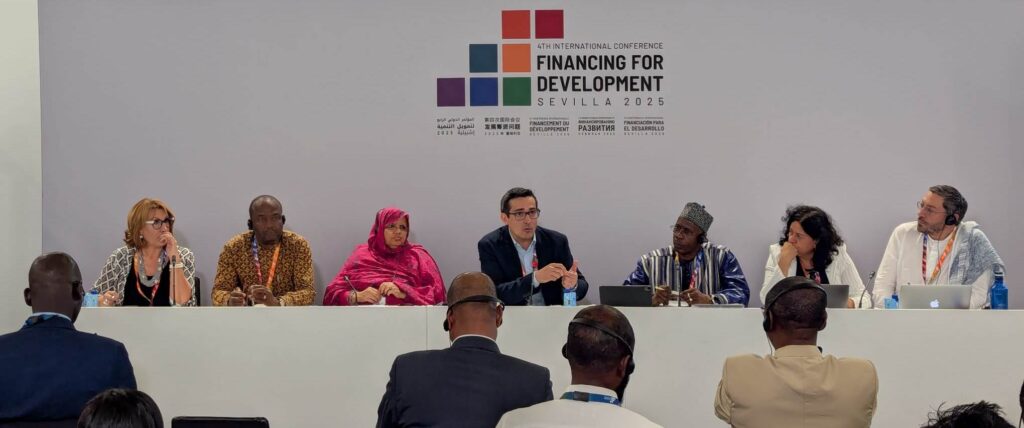
In a second session moderated by M. Carlos de Freitas, the General Secretary of FMDV, Mr. Madani Koumaré, the president of the African Network for Social and Solidarity Economy (RAESS) and co-coordinator of RIPESS, presented the MEREF-SDF model from Mali and the RIPESS proposal “Financing the Social and Solidarity Economy from the Ground Up: Democratic Intermediaries as Alternatives to Conventional Blended Finance”. Next was Mr. Rodrigo Peñailillo, who highlighted the significant progress of the Development Bank for Latin America and the Caribbean in promoting SSE, with a focus on SSE projects in southern Colombia. Following him was Mr. Philippe Akoa, CEO of the Special Funds for Equipment and Intervention of Cameroon (FEICOM), who works with various local government networks in Cameroon to strengthen SSE and communities in rural areas. Ms. Fatimetou Abdel Malick, the president of the Nouakchott region in Mauritania, shared her vision of the interdependency between advancing the local economic agenda in North Africa and strengthening vulnerable communities through sustainable, people-centered economic alternatives rooted in social justice and human rights. Finally, Ms. Emilia Saiz, General Secretary of the United Cities and Local Governments (UCLG), contributed to a long-term analysis of scaling out an SSE economy, which could bring about genuine transformation in the face of the current crisis through localization and interconnection with multistakeholder collaboration. Ms. Moreno concluded the session by calling for follow-up on the side event, taking into account Ms. Saiz’s closing remarks, and emphasizing the need to reinforce the multilateral agenda by defending both a UN Tax Convention and a UN Debt Convention, as they are directly linked to the advancement of SSE. No SSE accomplishments will have a long-term vision without support for strong global tax cooperation and restructuring of sovereign debt.
RIPESS at the World Assembly of Local and Regional Governments
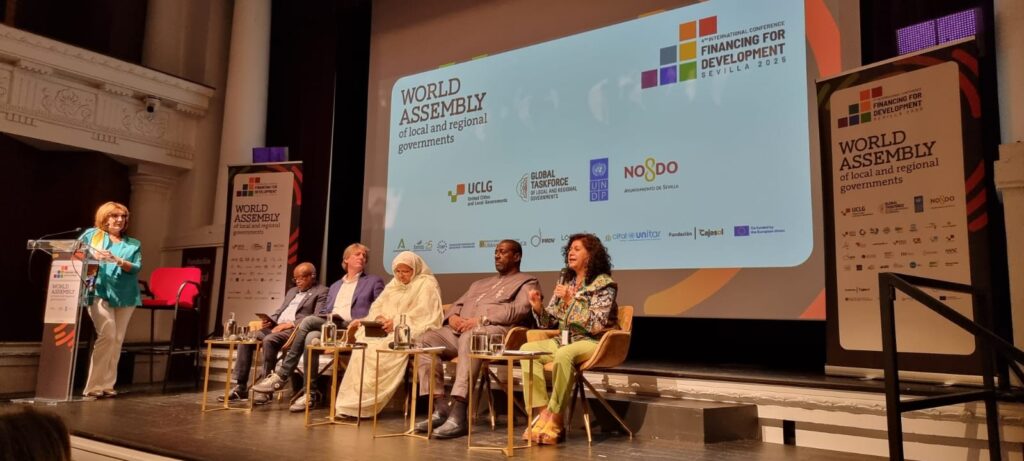
RIPESS was invited to participate in the World Assembly of Local and Regional Governments, convened by the Global Taskforce of Local and Regional Governments and facilitated by UCLG, on June 30 and July 1. Ms. Sandra Moreno, the executive secretary, participated in the panel “A Call for Networked Multilateralism and Inclusive Global Financial Governance” alongside Mr. Dada Morero, the executive mayor of Johannesburg, Ms. Fatimetou Abdel Malick, the president of Nouakchott and Mr. Carlos Martínez, the mayor of Soria, Spain, and the UCLG’s special envoy on the New Urban Agenda.
SSE and the Transformation of the Global Financial Architecture
RIPESS participated in the event “Financing Public Services: Fulfilling Human Rights and Building a Care Society”, organized by the Global Initiative for Economic, Social and Cultural Rights -GI ESCR:’ that brought together policymakers, international experts and civil society advocates to address the intersections of finance, human rights, public services and care. Her executive director, Camila Barretto Mai spoke in the introduction on the importance of SSE for bringing the solutions from the grassroots into the financial and development spaces agendas. RIPESS also participated in the Feminist Forum for and beyond the Fourth International Conference on Financing for Development (FfD4): Ushering an economic system based on care, justice and equality. This space was convened just before the CSO Forum and official FfD4 proceedings. It became a powerful space where feminist advocates, activists, researchers, and organisers from every region converged to refine collective positions, forged unified strategies, and assert a powerful feminist voice within and beyond the Financing for Development process and a just, gender-transformative financing for ALL — especially the Global South — and a complete overhaul of the global financial architecture. The Feminist Forum raised the “Red Flag” at the FfD4, demanding justice, reparations, and a gender-transformative economy from debt cancellation to tax justice, from demilitarization to feminist public services. In the final declaration the feminist forum called to “support the Social and Solidarity Economy (SSE) as a democratic and feminist alternative to extractive models of growth and to recognize and invest in SSE actors, including cooperatives, community-owned enterprises, and informal women’s collectives, that center care, equity, and sustainability in their operations and outcomes.”
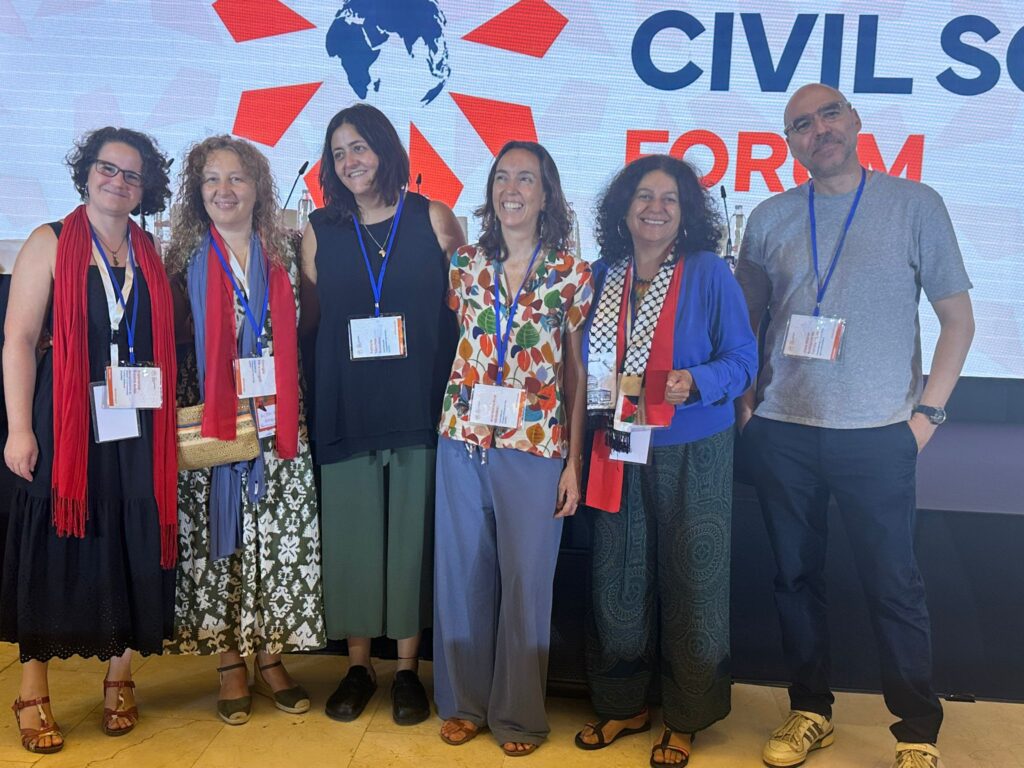
RIPESS also participated in the FfD4 Civil Society Forum, which took place on June 28 and 29. The final declaration addressed several concerns amid disappointment over the “lack of transparency and accountability of the process, which excluded civil society from access to the attributed text as well as the final rounds of negotiations. This closure of civic space continued up to the Conference in Sevilla, where civil society participation has been sidelined and tokenistic.” The declaration recognizes, as part of a new global financing framework: “We should also support alternative models of economic activity that prioritize community needs and the rights of present and future generations over corporate profit. This includes the social and solidarity economy, where cooperatives, mutual organizations, and other community-based initiatives play a larger role in delivering services and creating jobs.” However, the declaration expressed grave concerns about the Sevilla Commitment‘s failure to properly address solutions to the current global financial system’s inability to “address rising inequalities, debt distress, climate and ecological breakdown, and chronic underfunding of public services affecting billions of lives, especially in the Global South.” The ongoing reduction in Official Development Assistance (ODA), and the ambiguous steps forward for the reinforcement of a UN framework convention on sovereign debt and a UN tax convention, addressed by FfD4, are among the main points that civil society pointed out through the text and the different panels during the two days. Reaffirming the right to development while advancing international reforms to address systemic challenges and structural disparities is key to the future implementation of the FfD agenda. For SSE to be included in an inclusive multilateral agenda, our financing solutions must be systemic, integrated, and equitable.
RIPESS and local care approaches in Sevilla
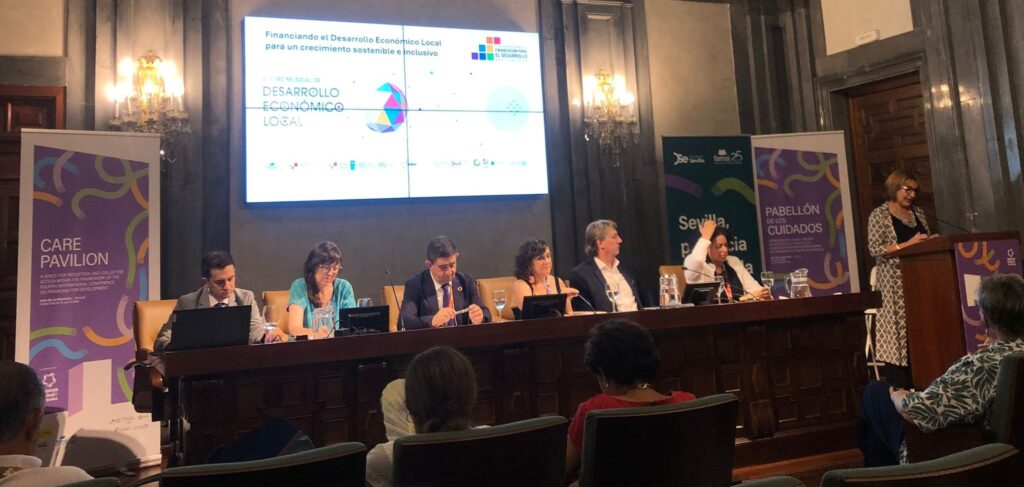
As a new member of the Global Alliance for Care, RIPESS was also present in the Care Pavilion at the Casa de la Provincia, the former headquarters of the Seville Provincial Council. The Global Alliance for Care promoted the Pavilion with the support of Spain’s Ministry of Equality, the Provincial Council of Seville, and the Andalusian Fund of Municipalities for International Solidarity (FAMSI). It was a central space for reflection, dialogue, political advocacy, and gathering efforts to position care financing as a structural priority in global economic and social development agendas. We were invited to discuss the most relevant elements of the SSE at the event “Financing Local Economic Development for Sustainable and Inclusive Growth” alongside María Guijarro, Secretary of State for Equality of the Government of Spain; Francisco Reyes, President of the Andalusian Fund of Municipalities for International Solidarity (FAMSI); Iñigo Arbiol, Deputy Director of the Secretariat of the Local Coalition 2030; and Ana B. Moreno, Technical Secretary of the Global Alliance for Care. The event aimed to contribute to FfD4 reaffirming the essential role of territories in achieving global development goals and emphasizing care as a transformative axis of the economic and social model. Recognizing care work, both paid and unpaid, as a central component of local economic development implies moving toward a more equitable, inclusive, and people-centered economy.

On the last day, Ms. Andrea Rodriguez from RIPESS Europe and Ms. Antonia Avalos and Ms. Lina Marcela Rincón from our local partnership in Seville, Mujeres Supervivientes, held a two-part event on new narratives from care and the SSE in the Care Pavilion. A Performance: “Bodies in Network, Connection, Care, and Shared Listening,” organized by Mujeres Supervivientes, and a conversation: “New Narratives from Care and Solidarity Economies: We Care, We Move Forward!” was organized by RIPESS, RIPESS Europe, and Mujeres Supervivientes.
Global Advocacy and Strategic Advances of the SSE
Mr. Jaime Iglesias, the Special Commissioner for the Social Economy of the Spanish Ministry of Labor and Social Economy, mentioned twice RIPESS’s support and help during an official side event at the FfD4. This was one of our major deliverables in resolution 79/213 and our work plan. RIPESS would like to thank the Spanish government for its special collaboration, particularly Ms. Yolanda Díaz, who led the Ministry of Labor and Social Economy of Spain’s team that supported the inclusion of the SSE in the multilateral agenda in recent years, including during the FfD4 process. We also want to acknowledge the significant efforts of the French and Luxembourgian governments within the European Union. In Latin America, RIPESS introduced the SSE to the FfD4 agenda during the ECOOVIDA forum in October 2024, which took place in Colombia along with the COP16 to the Convention on Biological Diversity negotiations. We paved the way of Colombian support with the Unit of Solidarity Organizations, the Ministry of Labor, and the Minister of Foreign Affairs, who made an important commitment towards the inclusion of SSE in the final outcome. Colombia and Chile were pivotal in accomplishing and defending SSE in the FfD4 negotiations, along with the EU. In addition, important support was also given by the governments of Brazil and Bolivia. While the AU adopted its 10-year SSE strategy in August 2024, Senegal also led the process of integrating SSE into the multilateral agenda and supported the significant outcome in Sevilla. Additional support came from Zambia and Kenya as well.
| Major Outcomes for SSE in the FfD4 These concerted efforts with government allies North and South, despite a very fraught negotiating environment, led to the inclusion in the Sevilla Commitment of the following clauses on SSE: Directly: Under section I. A renewed global financing for development framework: Para. 21. “We will invest in productive sectors, the creation of decent jobs at scale, and skills development to enable all people to benefit from inclusive, equitable and sustainable economic growth. We will… facilitate the growth of micro, small and medium enterprises, cooperatives and the social and solidarity economy…” Under section II.B. Domestic and international private business and finance: Para. 32.h): “We encourage support for social and solidarity economy entities including access to tailored financial and non-financial assistance from local, national, and international financial institution.” And indirectly, for countries that have already included SSE as part of their national priorities and plans, but need external financing support: Under section II.A. Domestic public resources: Para. 30.b): “We encourage multilateral development banks and development partners to enhance financial and technical support to national public development banks in their efforts to provide long-term low-cost financing to invest in sustainable development. We also encourage multilateral development banks and other development institutions to work as a system through enhanced cooperation and coordination with national development banks, in support of national priorities and plans”. |
The commitments to the creation of decent jobs at scale, investment in the care economy, recognition and redistribution of unpaid care and domestic work performed by women, and the promotion of the formalization of the informal economy and measures to extend social protection coverage were also important steps forward. The SSE has demonstrated the important role it can play in strengthening public policies that can enhance these pillars and advance the sustainable agenda.
These major steps have given our network a broader commitment to forming new alliances for SSE implementation, as well as a greater sense of urgency to explore ways where we will frame our labor and workers’ demands more in terms of macroeconomic issues in the future. Our experience with FfD4, as well as our engagement with civil society and national and local governments, opens the door for us to consider how SSE can be linked to macroeconomic policy and the importance of new economic paradigms. For SSE to enhance multilateralism also means to cross issue-based borders and link, bridge and support other current process like the binding UN treaty on multinational corporations and human rights, the right to development, the implementation of UNDROP and UNDRIP and other Human Rights special procedures. This requires to open our political imagination on how can transformative economies be key for advancing major structural financial reforms needed towards achieving our global SSE agenda.
